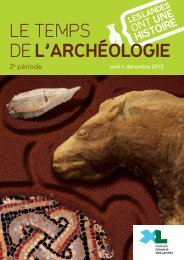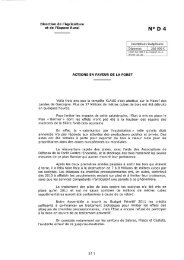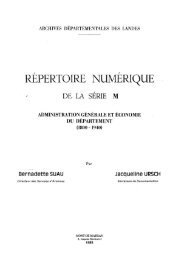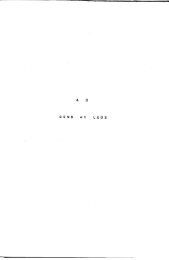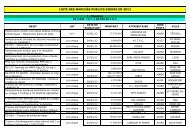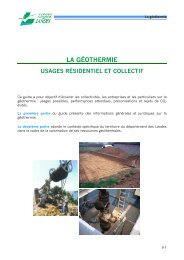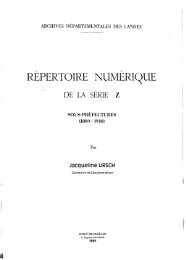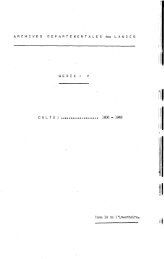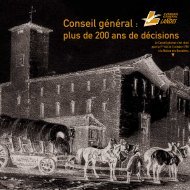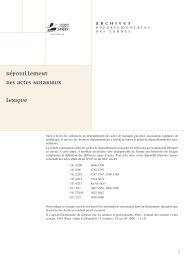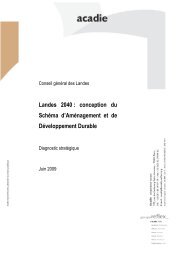188 ARCHIVES DES LANDES d'Hendaye à l'Hôtel . Passés ià, Dax ...
188 ARCHIVES DES LANDES d'Hendaye à l'Hôtel . Passés ià, Dax ...
188 ARCHIVES DES LANDES d'Hendaye à l'Hôtel . Passés ià, Dax ...
You also want an ePaper? Increase the reach of your titles
YUMPU automatically turns print PDFs into web optimized ePapers that Google loves.
Research & Education AssociationTHEY GIVE MAX FACTS FOR QUICK & EASY STUDY/REVIEWEUROPEAN HISTORY1648-1789INTERNATIONAL RELATIONSA. HISTORICAL SETTING IN 1648 – Thirty Years Warends, Germany and Central Europe devastated, Bourbondynasty stronger.B. PEACE OF WESTPHALIA (1648) – Dutch andSwiss republics recognized. Sweden, Prussia, andFrance gain new territory.C. TREATY OF THE PYRENEES (1659) – Spaincedes part of Spanish Netherlands to France. Louis XIVof France marries daughter of Phillip IV of Spain.D. WAR OF DEVOLUTION (FIRST DUTCH WAR),1667-1668 – Louis XIV claims Spanish Netherlandsafter death of Phillip IV. Triple alliance formed (England,Holland, Sweden).1. Treaty of Aix-la-Chapelle (1668) – France receives12 towns on border, but loses Franche-Comte (Burgundy).E. SECOND DUTCH WAR (1672-1678) – France invadesHolland. Dutch open dikes and flood land to beatFrench. Peace of Nijmegan grants Holland all territoryback.F. INVASION OF THE SPANISH NETHERLANDS(1683) – France occupies Luxembourg and Lorraine.League of Augsburg formed in response (Holy RomanEmpire, Holland, Spain, Sweden, Palatinate, Saxony,Bavaria, Savoy).G. WAR OF THE LEAGUE OF AUGSBURG (1688-1697) – France battles Holland and England on Rhine,in Low Countries, and in Italy.1. Treaty of Ryswick (1697) – Captured territories returned,French sovereignty over Alsace andStrasbourg acknowledged.H. WAR OF THE SPANISH SUCCESSION (1701-1713)1. The Grand Alliance – England, Holland, Holy RomanEmpire, and Prussia support Charles VI andoppose Phillip of Anjou for Spanish throne.2. War – Battle of Blenheim prevents French fromdominating Europe. French and Spanish drive Alliesfrom Spain and place Phillip on throne.I. TREATY OF UTRECHT (1713) – Spanish empirepartitioned, Phillip V crowned King, Hapsburgs gainSpanish Netherlands, England gains territory in NewWorld.J. WAR OF THE AUSTRIAN SUCCESSION (1740-1748) – Frederick the Great invades Silesia. Englandsides with Hapsburgs against Prussia, Bavaria, France,and Spain. Prussia retains Silesia and emerges as greatpower.K. THE SEVEN YEARS’ WAR (1756-1763) – Austriaattempts to regain Silesia with help of France and Russia.Britain sends funds to Prussia.1. Treaty of Paris (1763) – France loses all New Worldpossessions to Britain, Spain cedes Florida to Britain.L. THE AMERICAN WAR FOR INDEPENDENCEAS A EUROPEAN WAR, 1775-1783 – France andSpain join Americans to regain territories lost to Britain.1. Treaty of Paris (1783) – Britain recognizes U.S. andretrocedes Florida to Spain, France gets nothing.ECONOMIC DEVELOPMENTSA. TRADITIONAL ECONOMIC CONDITIONS – Subsistencefarming the norm, contagious diseases decimatetowns.B. MERCANTILISM – Wealth measured in commodities,increases power of government, favorablebalance of trade important, colonies existed formother country.C. GROWTH OF TRADE – Route around Africa to Asiadiscovered and opening of Western Hemisphere.D. AGRICULTURAL CHANGES – Growth of absenteelandlords and commercial farms. All-metal plowscome into widespread use.E. IMPROVEMENTS IN TRANSPORTATION – Canallock invented. All-weather roads constructed.F. INDUSTRIAL TECHNOLOGY – Steam engine developedand improved (1769), textile machines revolutionizedindustry (flying shuttle, spinning jenny, spinningframe, power loom).SCIENCE, LEARNING, ANDSOCIETYA. REVOLUTIONS IN SCIENCE – astronomy and scientificmethodologies experienced great advances.1. Copernicus – heliocentric theory of universeplaced humans in a vast system.2. Tycho Brahe – made important observations of theheavens that swept away age-old myths of the unchangingsky.3. Johannes Kepler – established the concept of theelliptical orbits of the planets.4. Galileo – discovered four moons of Jupiter and expandedthe use of the telescope; his support of scientificobservations brought him into conflict withthe church.5. Francis Bacon – formalized empiricism and advocateduseful knowledge.6. Rene Descartes – formulated analytic geometryand believed scientific laws could be found by deductivereasoning.B. SCIENTIFIC SOCIETIES – Royal Observatory (Britain,1675), Royal Society (Britain, 1662), Academie desSciences (France, 1666), Berlin Academy of Sciences(Prussia, 1700), St. Petersburg Academy of Sciences(Russia, 1725)C. THE AGE OF THE ENLIGHTENMENT – Secularview of the world; God created it then was no longerinvolved.1. Rationalists – stressed deductive reasoning ormathematical logic.2. Empiricists – inductive reasoning, emphasis onsensory experience.3. The Philosophes – teachers and journalists whopopularized Enlightenment.D. THE “COUNTER-ENLIGHTENMENT” – Diverseand disparate groups who opposed Enlightenment.E. RESULTS OF SCIENTIFIC INNOVATIONS – experiencedthroughout society.1. Schools of mathematics and physics established inEuropean universities.2. Warfare became more precise as a result of mathematicalmeasurements.3. Science of medicine employed new thinking to discoverworkings of human body.4. Scientific methods employed by philosophers todevelop new ideas.BOURBON FRANCEA. FRANCE UNDER LOUIS XIV (1643-1715)1. Government of France Under Louis XIV – Aristocracykept out of government, orders transmitted toprovinces by intendants, nullification of all institutionsthat might challenge Louis. Peasants notfarming conscripted into army or workhouses.Growth of French trading companies and merchantmarine.2. Palace of Versailles – Third of a mile long, 1400fountains, 60% of taxes put toward upkeep of courtand attendants.3. Louis XIV’s Policies Toward Christianity – Pope hasno temporal authority over French Church, Protestantspersecuted, many flee to England and Holland.B. FRANCE UNDER LOUIS XV (1715-1774) – Inheritsthrone at age five. Leaves the same problems as heinherited.C. FRANCE UNDER LOUIS XVI (1774-1792) –Sought to make reforms, aristocracy refused to implement,married to M. Antoinette.SPAIN: HAPSBURG ANDBOURBONA. SPAIN IN THE SEVENTEENTH CENTURY – Continuedexpulsion of Moors, industry declines, Spanishnavy ceased to exist by 1700.B. CHARLES II – sick and timid, dies childless whichleads to War of Spanish Succession.C. PHILLIP V (1700-1746) – Modernizes Spanish army,industry, agriculture, and ship-building revived; hisson, Ferdinand VI, rules 1746-1759.D. CHARLES III (1759-1788) – Continues to enact reforms,eliminates laws that restrict internal trade.Strongly Catholic, Spanish intellectuals ignore Enlightenment.AUSTRIAN HAPSBURG ANDCENTRAL EUROPEA. GOVERNMENT OF THE AUSTRIAN EMPIRE –Consists of remnants of Holy Roman Empire, no singleconstitutional system for all parts.B. FEUDALISM IN THE HAPSBURG EMPIRE – Lordof manor has absolute control over lives of peasants.C. MUSIC AND VIENNA – Leopold I is patron of music.People from around Europe come to Vienna to compose.D. EMPEROR LEOPOLD I (1658-1705) – Patron ofarts, devout Catholic, drove Turkish army from Austria(1683).E. EMPEROR CHARLES VI (1711-1740) – Takesthrone after death of his older brother. Recognizes personalliberties of Hungarians (Treaty of Szatmar).F. MARIA THERESA (1740-1780) – Increases army,centralized government of empire in Austria.G. JOSEPH II (1765-1790) – Ruled with his mother forfirst 15 years, expanded state schools, granted religioustolerance.PRUSSIA AND THEHOHENZOLLERNSA. FREDERICK WILLIAM (1640-1688) – increasesarmy through heavy taxation, build canal to link Elbeand Oder Rivers. Settled Huguenots on his estates.B. FREDERICK I (1688-1713) – Founds several universities,encourages intellectuals as well as tradesman tosettle in Prussia.C. FREDERICK WILLIAM I (1713-1740) – Fourthlargest army in Europe, paid off Prussia’s debts, increasedtreasury, developed most efficient bureaucracyin Europe.D. FREDERICK THE GREAT (FREDERICK II: 1740-1786) – Pondered questions of religion, morality, andpower; read French poetry. First 23 years of reign spentat war, the second 23 spent rebuilding a population thathad doubled in size and increased territory.THE DUTCH REPUBLICA. GOVERNMENT OF THE NETHERLANDS – Consistedof seven provinces, each with Stadholder, na-RESEARCH & EDUCATION ASSOCIATION, 61 ETHEL ROAD WEST, PISCATAWAY, NJ 08854




